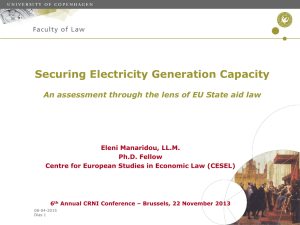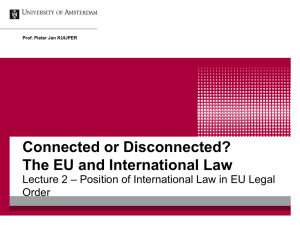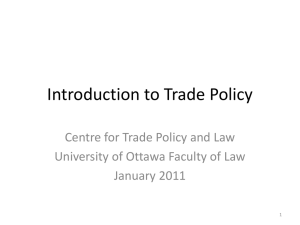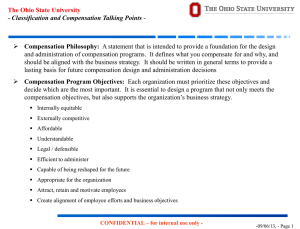Services of General Economic Interest in EU and WTO Law
advertisement
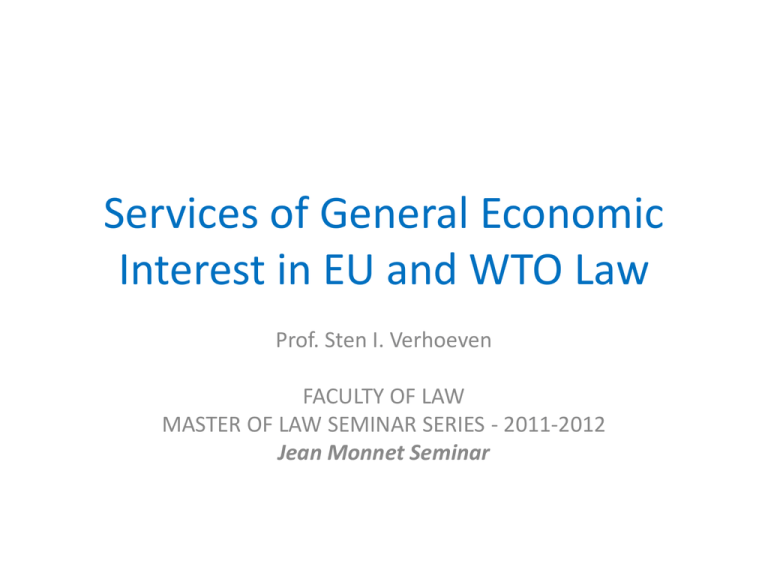
Services of General Economic Interest in EU and WTO Law Prof. Sten I. Verhoeven FACULTY OF LAW MASTER OF LAW SEMINAR SERIES - 2011-2012 Jean Monnet Seminar Introduction • Services of general economic interest (SGEI) play an important role in the EU: in a lot of Member States they are the backbone of the socio-economic model and are an important aspect of the welfare State that is characteristic to most of the EU Member States • The objective of SGEI is to provide social services to the public at large, without discrimination, a service which is considered to be in the general interest (postal services, public transportation, waste management, …) • In principle those services could be provided by the market, but because of the focus on profit the market would not provide the services efficiently to all • SGEI are an important instrument to realize a society based on solidarity and social justice, where basic services are available to all at affordable costs Introduction • SGEI are one of the values of the EU, but they conflict with other values – The EU on the one hand promotes an internal market with an open market economy and competition but SGEI distort the market since they have an impact on the free movement of services and often involve State aid – On the one hand there is a movement of liberalization of services, on the other hand there is support for SGEI – Have those tensions been resolved and how? Introduction • SGEI also involve other issues at EU level: the link between SGEI and public procurement; the role of the EU as opposed to the Member States; intra-EU tension between the Commission, the EP, the Council and the ECJ • The importance of SGEI for the European welfare State have come under pressure of international developments – Economically: the financial crisis has let to austerity measures in (some) EU Member States which includes cutting in costly social services – Politically: the belief in the supremacy of the market; the market as the most efficient tool in providing services for the public at large – Legally: the trade liberalization at the international level, in particular the WTO Introduction • The seminar will address the following issues – The concept of SGEI – The legal framework of SGEI in the EU, in particular in the field of State aid and freedom of movement of services – The seminar will deal with SGEI in general, making abstractions of SGEI in transport, postal services, energy and telecommunication that have been regulated by EU law – SGEI in WTO law and the possible impact of WTO law on EU law – Future developments Concept of SGEI in EU Law • Despite being mentioned in EC Treaty and the Treaty of Lisbon, the concept of SGEI is as such not defined in primary EU law • The Commission has made a distinction between services of general interest (SGI) and SGEI – SGI is a broad concept that includes both market and non-market services which public authorities deem to be of general interest and are subject to specific public service obligations – A general interest is determined by the criteria of universality, accessibility, transparency and continuity – SGEI are market services which Member States have subjected to specific public service obligations because of the general interest: they are economic activities – The opposite of SGEI would be non-economic service of general interest which do not fall under EU competition law and the internal market Concept of SGEI in EU Law • The distinction between economic and non-economic SGI is clarified by the concept of an undertaking in competition law – Any entity engaged in an economic activity regardless of the legal form and financing of that entity – An economic activity is any activity involving the offering of goods and services in a market (however not the buying: ECJ, C-205/03 FENIN) – Non-economic activity involves activities that do not involve trade, such as the traditional State functions • Having a public service obligation does not preclude the economic nature of the activity • Non-for-profit undertakings that offer emergency services are considered to perform an economic activity if there is a given market: C-475/99 Ambulanz Glöckner • Monitoring of oil pollution in oil port by a private law entity was however not considered an economic activity: ECJ, C-343/95 Diego Cali • Activities of a social nature are non-economic (e.g. compulsory health insurance where level of insurance does not depend on the contribution: ECJ, C-264/01, AOK Bundesverband), unless these activities are subject to competition in the Member State Concept of SGEI in EU Law • Nevertheless, the concept is not clear in the field of freedom of movement of services – In order to fall under the free movement of services a service has to be performed across borders and against remuneration • Hence, a service is always economic so that the distinction between economic and noneconomic services is pointless in this context (see also ECJ, C-205/03 FENIN: an economic activity involves the offering of services) • The ECJ has held that hospital treatment in another Member State is a service (C-372/04 Watts) in the context of freedom of movement of services, whereas in competition law it can be a non-economic service • In addition compulsory social security schemes have been investigated on their conformity with freedom of movements of services (ECJ, C-355/00, Freskot; C-350/07, Kattner Stahlbau) • What to do with Article 2 Protocol No. 26: Treaties do not affect the competence of the Member States to provide, commission and to organize non-economic services of general interest – The Service Directive makes a confusing distinction between Services of General Interests and SGEI; at the same time it considers the postal, electricity and gas sectors, water distribution and supply services and waste water services as SGEI EU Legal Framework A. Primary EU Law • The Treaty on the Functioning of the EU mentions the notion of services of general (economic) interest in: – Article 14: • SGEI are a shared value of the EU and promote social and territorial cohesion; • The European Parliament and the Council can make regulations setting out the principles and conditions that regulate the operation of SGEI and their funding. – Article 106 (2): • Undertakings performing a SGEI fall under the rules of the TFEU, including competition so far as those rules do not obstruct the performance of the SGEI; • Trade may however not be affected so much that it would go against the interest of the EU. EU Legal Framework • Charter of Fundamental Rights of the EU – Article 36: it is a fundamental right to have access to SGEI as provided in national law and in accordance with the Treaties – SGEI not only an exception to competition but also a right of citizens? • Protocol No. 26 on Services of General Interest – The Treaties are not applicable to non-economic services of general interest: first time enshrined in primary law – Article 14 TFEU implies that the Member States play an essential role and have a wide discretion in organizing SGEI; – The diversity of SGEI is recognized: different users in different countries demand different SGEI; – Article 14 TFEU includes high quality, safe and affordable SGEI, equal treatment, and the promotion of universal access. EU Legal Framework B. State aid and SGEI • Article 106 (2) (ex Article 86 (2) EC Treaty) provides a delicate balance between the internal market, competition and services in the general interest • SGEI fall under EU law, but they can derogate from the rules of competition if they fulfill certain criteria • The focus has been on how SGEI have been funded, with not always consistent case law of the ECJ and General Court (ex CFI) – Early case law of the ECJ stated that if the funding was solely covering the extra costs of performing a SGEI it is compensation and does not fall under State aid – CFI held that such compensation was State aid that was justified under then Article 86 (2) EC Treaty – C-280/00 Altmark Trans: ECJ clarified that compensation will not be State aid if certain cumulative criteria are met EU Legal Framework • Pursuant to Article 107 (1) TFEU SGEI that affect trade between Member States would be classified as State aid, requiring Member States to notify the Commission and before approval not to allocate funds • However, it has been argued that funding for the extra costs an undertaking would have due to a service in the general interest would not be State aid, but merely a compensation → It would not fall under Article 107 (1) and Article 106 (2) because it does not involve advantages for the undertaking • The CFI was of the opinion that the rules of State aid should be applied (CFI, T-106/95 FFSA and CFI, T-46/97 SIC), whereas the ECJ adopted the compensation approach, but only in so far the compensation covered the costs EU Legal Framework • In Altmark Trans the ECJ adopted a compromise position: such funds would be considered compensation if it fulfilled four criteria: – There must be a prior entrustment of a public service obligation – The parameters of the calculation of the compensation must be set in advance in an objective and transparent manner – The compensation may only cover part of or the total costs and a reasonable profit – If the undertaking is not chosen through public procurement, the amount of compensation is that of the cost a typical and well-run undertaking would have in effectively discharging the public service • If one of the conditions is not met, than the funds are qualified as State aid to which Article 106 (2) may apply • The first three criteria are very similar to the conditions of Article 106 (2) and the case law on that provision • The EU Commission and the General Court (CFI) have interpreted the Altmark criteria quite strictly and few funds have been considered purely aid-free EU Legal Framework • The General Court (CFI) seems to have however made the Altmark criteria more flexible in its decision in case T-289/03 BUPA: – The CFI confirmed the large discretion of Member States, only subject to review for manifest errors – First Altmark Trans criterion (entrustment): • A SGEI must not be entrusted by a specific act, it could also be done by a general obligation for all market operators • A SGEI must not be universal and can allow the operator a certain freedom to set the price and product differentiation EU Legal Framework – Second Altmark Trans criterion (objective and transparant compensation): National authorities can have a certain discretion in determining the compensation and the costs of the SGEI – Third Altmark Trans criterion (necessity and proportionality): Member States also have a margin in the implementation of the conditions of the SGIE – Fourth Altmark Trans criterion: if no procurement and not possible to calculate the costs of a typical and well-run undertaking, it suffices that the compensation cannot be used to cover inefficiencies EU Legal Framework • In case the Altmark Trans criteria are not fulfilled, the funding of SGEI is State aid, but can be justified on the basis of Article 106 (2) TFEU • Nevertheless, the Altmark Trans criteria are very similar to the criteria of Article 106 (2) – It must concern the operation of a service of general economic interest – Act of entrustment, specifying nature and duration of the service – The derogation must be necessary and proportionate – Not be contrary to the interest of the EU EU Legal Framework • First criterion of SGEI – Supra for definition – Member States have large margin of discretion; only manifest error or misjudgments will not be accepted – SGEI mostly involve services that have to be performed even if not profitable – According to T-289/03 BUPA SGEI involve services of a universal and compulsary nature – The Commission takes into account the universal access, high quality, affordability and complete territorial coverage EU Legal Framework • Second criterion of entrustment – Legal certainty and transparancy: the scope and mission of the SGEI must be clear – By official act of a public authority of a Member State • Third + fourth criterion: proportionality – Proportionality in that undertakings are exempted from the rules of competition as far as this is necessary for the execution of the SGEI – Proportionality in that the SGEI’s restriction of trade may never go against the interests of the EU EU Legal Framework • At the end of 2011 the Commission adopted new rules on State aid and SGEI – Commission Decision of 20 December 2011, OJ 11 January 2012, L 7/3: specifies which conditions need to be fulfilled for compensation for a SGEI to be consistent with the internal market, how to calculate compensation, demands transparency and control against overcompensation – Commission Regulation (EU) No. 360/2012, OJ 26 April 2012 L 114/8: total amount of de minimis aid granted to one undertaking providing SGEI that do not exceed 500000 € over a period of three fiscal years are not considered to fall under Article 107 (1) TFEU EU Legal Framework – Communication on the Application of the European Union State Aid Rules to Compensation Granted for the Provision of Services of General Economic Interest, OJ 11 January 2012, C 8/4 – Communication European Union Framework for State Aid in the Form of Public Service Compensation, OJ 11 January 2012, C 8/15 EU Legal Framework C. Freedom of movement of services and SGEI • The freedom of movement of services is one of the core elements of the internal market: Article 61 TFEU prohibits discrimination based on nationality and residence of the service provider • The ECJ has expanded the freedom of movement of services: any measure applicable to both national and foreign service provider when it is liable to prohibit or otherwise impede the activities of the service provider established in another Member State where he lawfully provides the service (Case 76/90 Säger) • The ECJ has also formulated a rule of reason with similar criteria as in Rewe (Cassis de Dijon): Case 219/08 Commission/Belgium: no harmonization, no distinction on the basis of nationality, an imperative reason and proportionality EU Legal Framework • Nevertheless, the EU has harmonized the trade in services by the Services Directive: Directive 2006/213/EC of the European Parliament and the Council on Services in the Internal Market, OJ 27 December 2006, L 376/36 • The Services Directive does also apply to SGEI – The Services Directive applies to all services performed for an economic consideration – The Services Directive excludes Services of General Interest since those services do not fall under the freedom of movement of services (Article 2 (2)(a) refers to non-economic Services of General Interest) – Since SGEI involve an economic activity they are covered by the Services Directive EU Legal Framework – Nevertheless the Services Directive limits its subject and scope so that SGEI are not negatively affected • The subject matter does not deal with the liberalization of SGEI, with State aid and does not affect the competences of Member States to define a SGEI • Certain categories of SGEI are excluded: health care services, social services relating to social housing, childcare and support of families and persons permanently or temporarily in need • The Directive also does not apply to sectors where SGEI are likely to be found: transportation and audiovisual services EU Legal Framework • Under Article 9 Services Directive Member States may not subject services to an authorisation scheme except if nondiscriminatory, reason of public interest and proportionate – If a Member State wants to organize a SGEI by introducing an authorization scheme it has to respect the requirements of Article 9 – This goes against the regulatory discretion of Member States and is much more strict than Article 106 (2) TFEU • Pursuant to Article 15 Member States have to evaluate their national legislation on the use of certain requirements and make sure that those criteria respect the rule of reason; Article 15 (4) states however that requirements necessary for a SGIE should not be affected by the evaluation EU Legal Framework • Pursuant to Article 16 Member States must respect the right of providers to provide services in a Member State in which they are not established – Member States have to ensure free access to and free exercise of a service activity in their territory – Restrictions have to respect the rule of reason or have to be justified for reasons of public policy, public security, public health or the protection of the environment – Article 17 excludes however SGEI, including the postal, electricity and gas sector; water distribution and supply services and waste water services; treatment of waste • Concluding: – The Services Directive protects SGEI too extensively when it concerns temporary services – It is too strict when SGEI are established by authorization schemes. – The freedom of movement of Services and SGEI is incoherently regulated SGEI in WTO law • The balancing of SGEI with competition in order to generate a welfare State is a typical European value • SGEI have been progressively incorporated in EU law, but the EU operates in a global world • The EU should not focus only on how to protect SGEI internally, but also externally, in particular in the framework of the WTO • The WTO focuses on the liberalization of trade, including services and this might conflict with the SGEI as an important value of the EU SGEI in WTO Law • The EU has exclusive competence in the common commercial policy, which after the Treaty of Lisbon includes trade in all services, but for certain services there will be a need for consensus in the Council (cultural and audiovisual sector, education, and social and human health services) (Article 188 TFEU) • Outside the domain of common commercial policy the EU has implied powers to conclude agreements, but only to the extent the EU has already acted internally (Article 3 (2) TFEU; ECJ, Case 22/70 Commission/Council AETR); e.g. transport and environment • In the context of SGEI the GATS is highly relevant → how are SGEI dealt with in that agreement SGEI in WTO Law • Article I (2) GATS defines trade in services as the supply of a service in four modes: – From the territory of a Member into the territory of another Member – In the territory of one Member to the service consumer of another Member – By a commercial supplier of one Member, through a commercial presence in another member – By a servive supplier of one Member, through presence of natural persons, in the territory of another Member • Although GATS does not define “service”, it does exclude services supplied in the exercise of governmental authority SGEI in WTO Law • A service supplied in the exercise of governmental authority is in turn defined as “any service which is supplied neither on a commercial basis, nor in competition with one or more service suppliers” – “Commercial” means that it concerns a service that is supplied on a profit-seeking basis • Since SGEI are economic activities they are often supplied with the idea of making profit • State aid is often given to off-set the costs of public service obligations, but this compensation might include a reasonable profit • Only when the SGEI would not be able to be performed on a profitable basis at all would it fall under this exception SGEI in WTO Law – “Nor in competition with one or more service providers” • There might be some competition between providers of a SGEI, cf. ECJ, C-264/01, AOK Bundesverband • Competition is regarded as broad: it involves the question whether two services can be substituted for one another – A large number of WTO members have excluded SGEI in their commitments, which implies that they consider those services to fall under GATS • SGEI are likely falling under GATS and the more they are liberalized and deregulated, the more it will be unlikely they are exempted SGEI in WTO Law • Nevertheless, if SGEI fall under the scope of GATS this does not mean that they are regulated by it – GATS is based on a positive list approach: services only need to be liberalized if the Members have committed themselves in their schedules to liberalize these services or sectors – If a Member has committed a sector, then SGEI in that sector will often conflict with: • Article XVI (market access): limitations on service providers by monopolies or exclusive service providers • Article XVII (national treatment): treatment no less favourable than that it accords to own like services and service suppliers. SGEI in WTO Law • EU has a horizontal limitation for public utilities at a national or local level which may be subject to public monopolies or to exclusive rights granted to private operators – Only for mode 3: a commercial supplier of one Member, through a commercial presence in another member – All services which are considered necessary for a society (cf. French wording: services considérés comme services public): e.g. environmental services, health services, transport services • EU and Member State commitments in postal, educational, health, social and environmental services are limited • Concluding, at this point in time SGEI in EU are not conflicting with GATS, but: – The emphasis of GATS is to progressively liberalize trade, not to balance SGEI with international trade – EU will come under pressure of other WTO Members to open its markets further for trade in services, also in areas of SGEI – First warning shot before the bow: in US Gambling Article XVI was broadly interpreted as prohibiting any measure that might reduce market access Conclusion and Future Developments • SGEI are in ascendency in the EU: they are explicitly mentioned in primary law as one of the values of the EU and after the Treaty of Lisbon, the EU has obtained legislative power in this area • Nevertheless, the concept is not clear, is treated differently in the areas of competition law and freedom of movement of services, and the case law of the ECJ is not entirely consistent • At the level of the WTO although SGEI would fall under the GATS, the EU has shielded them from the GATS, but due to progressive liberalization that exclusion will eventually come under pressure – A solution would be in the long term to adopt an agreement at WTO level covering SGEI and their regulation – Considering the EU experience in balancing free trade and competition with SGEI within the EU, it could offer its expertise and assistance in this field – Therefore, it would be useful that the EU would adopt internal legislation on SGEI as an example for an international agreement on the issue
